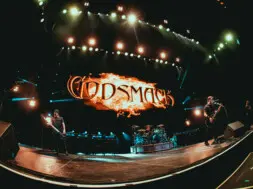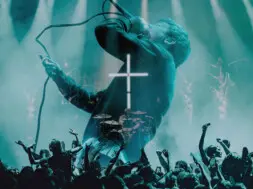
Nothing marks out a proper progressive metal band like a double concept album. Separated into two distinct products but intended for enjoyment as one whole, the twin parts of ‘Juggernaut’ have been long awaited and anticipated, mention of it having been made back before the release of ‘Periphery II’. The stakes, therefore, are high.
Despite having been one of the most interesting and capable (not least successful) bands of the late-‘00s djent explosion, Periphery have continually struggled to transcend the movement they’ve spearheaded. A debut of continually-reheated tracks and transparent sequel follow-up haven’t helped in that regard, though last year’s ‘Clear EP’ showed that the group did have ideas beyond their station, if not a coherent new one to move into. If anything the ‘Juggernaut’ project feels like the first proper next stage in their career since the initial ‘Periphery’ album, crucially thanks to the band’s successful marriage of their typical blueprint to new ideas, as well as the thematic framework that helps them explore those ideas.
Though they do neatly mesh together, the ‘Alpha’ and ‘Omega’ parts of Juggernaut are very different in emotional tone if not musical approach. ‘Alpha’ is by a considerable margin the most positive, accessible and chorus-centric collection of material Periphery have released to date, made most obvious by the almost disposable pop refrain on “Heavy Heart” but also clear from the big hooks on the title track and “Rainbow Gravity”. Moving focus away from the downtuned rhythmic grooves of the past (a trait of the whole ‘Juggernaut’ concerto) and onto surprisingly memorable melodies makes this album not only distinct from previous albums but also a coherent body of work. There are crushingly heavy moments – see the contorting assault of “MK Ultra” and brief but punishing instrumental “Four Lights” – but the song “Alpha” itself is stunning in its beauty, a video game synth intro giving way to sweeping melodic guitars and a killer chorus, while equally good is the Slipknot-goes-prog metal anthem “22 Faces”.
If ‘Alpha’ is the half of ‘Juggernaut’ that will hook new listeners, ‘Omega’ will more likely appease long-time fans. That’s not to say it represents regression, and is closer to ‘Alpha’ than the self-titled records, but its darker and more instrumental-focused angle of attack makes it less accessible and more rewarding given repeated listening. “Priestess” is a haunting pseudo-ballad, made all the more effective by the razor-sharp twists and turns that follow on “Graveless”. “Hell Bellow” reaches Gojira levels of heaviness (with a pick slide to boot) before the near 12-minute “Omega” track dizzies with its intensity. Though probably the weaker of the two albums taken in isolation, ‘Omega’ represents a formidable continuation of what came before that effectively flips some of the ‘Alpha’ motifs onto a darker spectrum.
This being a Periphery record the whole thing is of course immaculately produced, with a particularly clear and vicious low end. If anything the instrumental arrangements have been reined in from previous works, which is something of a disappointment particularly due to the lack of noteworthy riffs aside from on “22 Faces” and “The Bad Thing”. Spencer Sotelo on the other hand has made huge progression as a vocalist, and might be the most improved in modern rock. His once hollow screams are now full, brutal roars, while greater control of his clean singing benefits the hooks immeasurably. The concept explored through the lyrics is by no means easy to follow but there’s no prog cheese to be found anywhere, the apocalyptic tones well matching the cacophony that the words are layered onto.
‘Juggernaut’ may turn out to be the most important album(s) Periphery put out in their career. By a considerable margin their best overall work, it has both depth and immediacy and crucially leaps the ‘more than djent’ hurdle the band have long tried to vault with ease. A demanding listen as a whole, it is nonetheless best absorbed as one piece of work (though ‘Alpha’ is the more enjoyable half in isolation). There are certainly worse ways of spending an hour and a half than immersing oneself in a flowing, well-executed piece of work that more than ever distinguishes Periphery as among the most vital young bands in progressive metal.















